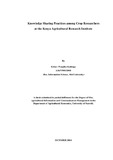| dc.description.abstract | This study sought to explore the knowledge sharing
practices
employed by
crop
researchers
at the Kenya Agricultural Research Institute (KARI).
KARI
accounts for more than half of both total research spending and agricultural
researc
h numbers, and has 11 main
research centres strategically spread
throughout
Kenya.
The aim of the study was to stu
dy the knowledge sharing
practices among
KARI
crop researchers
.
To
achieve the set
objectives
, the
study
sought to
identify
the
extent to which
different
knowledge sharing
methods
are
used,
to find out
f
actors that
influence knowledge sharing among
the cro
p researchers,
to determine constraints in knowledge shari
ng among the
researchers;
and to understand how knowledge sharing at the institute can be
improved
.
The study adopted
the social e
xchange
t
heory to
get insights on
factors that influence
knowledge s
haring among
researchers at KARI
, and
adopted
a qualitative approach to data co
llection and analysis. T
he
questionnaire
was the
principal data collection tool.
Data w
ere
collected from
80
crop research
ers
drawn
from
representative
eight research cent
r
e
s
.
T
he
study f
ound
t
he use of seminars
, conferences
and workshops as the
most
frequently used methods of
knowledge sharing
by
researchers at KARI.
The
findings also indicated
that the modern
methods of knowledge sharing such as
blogs, communities of practice,
and online discussion forums were rarely used
by crop researchers
hence making it difficult to achieve vibrancy in the
knowledge sharing process at the institute. E
-
mail and telephone
communication
were moderately used
.
With
regard to the factors that
infl
uence know
ledge sharing among researchers, the study found that for
majority of the crop researchers, trust determines who they share knowledge
with. More than half of the researchers also felt that the
rewards
offered
to
encourage knowledge sharing at the
institute were not sufficient even though
there was good intra
-
team sharing of knowledge in research teams. The
greatest constraints to knowledge sharing at the institute were identified as
plagiarism and
piracy
and hence some of the suggestions to improv
e
knowledge sharing were to address the challenges of plagiarism
and piracy in
the institute. T
he study recommends
that KARI develops
a
knowledge sharing | en_US |

